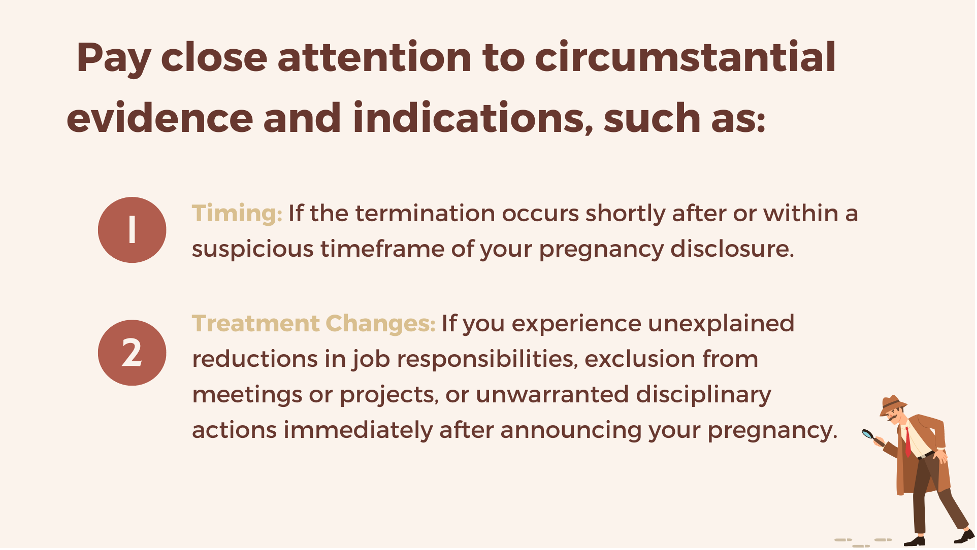Discovering you’re pregnant often brings a whirlwind of emotions. However, facing wrongful termination from your job due to your pregnancy can compound the distress. Losing your income and benefits at such a crucial juncture seems unfair and unlawful – and it is.
Understanding your rights and taking the proper legal actions is paramount to protecting yourself and your family.
Understanding Your Rights
The Pregnancy Discrimination Act (PDA) is a pivotal federal law that prohibits discrimination based on pregnancy, childbirth, or related medical conditions. Amended to Title VII of the Civil Rights Act of 1964, the PDA obligates companies to treat pregnant employees the same as other temporarily disabled employees.
The Equal Employment Opportunity Commission (EEOC) enforces the PDA, investigating complaints and enforcing anti-discrimination laws. However, it’s essential to note that state laws can provide additional protections, so consulting local resources or an attorney is advisable.
The Pregnancy Discrimination Act mandates that women affected by pregnancy, childbirth, or related conditions must be treated the same as other employees in their ability or inability to work.
– U.S. Equal Employment Opportunity Commission
Identifying Wrongful Termination Due to Pregnancy
While companies may attempt to provide various reasons or justifications for terminating a pregnant employee, certain patterns and circumstances can signal pregnancy discrimination. Be extremely wary if performance issues or alleged infractions suddenly arise after you announce your pregnancy, as this could be a thinly veiled, disguised reason for wrongful termination due to your pregnancy status.
It’s crucial for an employee to document everything meticulously, including all emails, memos, performance reviews, and any witness statements that could potentially substantiate your claim of wrongful termination.

Recognizing these telltale signs can help an employee build a strong case and take timely legal action to protect their rights.
In cities like Los Angeles, where the cost of living is high and the job market is competitive, wrongful termination due to pregnancy can have severe repercussions. If you believe you’ve been unjustly fired, it’s crucial to consult a wrongful termination lawyer Los Angeles who can guide you through the legal process and help protect your rights.
Steps to Take After Wrongful Termination
If you suspect or have evidence that you’ve been wrongfully terminated due to your pregnancy, immediate and decisive action is crucial. Here are the critical steps an employee should take:
- Gather Evidence: Collect and carefully organize all relevant documentation, including emails, performance reviews, witness statements, records of discrimination or harassment, and any other materials that support your claim of wrongful termination.
- Consult an Attorney: Contact a reputable employment law attorney who specializes in pregnancy discrimination cases. An experienced lawyer can assess the specifics of your situation, advise you on the strength of your case, and guide you through the complex legal process.
- File a Claim with the EEOC: The EEOC is the federal agency that enforces anti-discrimination laws,including the Pregnancy Discrimination Act. Filing a formal claim or charge of discrimination with the EEOC is often the necessary first step in pursuing legal action. However, be extremely mindful of the statute of limitations, which is typically 180 days (or 300 days in some states) from the date of the discriminatory act or wrongful termination.
Don’t delay in taking these steps, as missing crucial deadlines could severely jeopardize or invalidate your case entirely.
Legal Remedies and Compensation
If your claim of wrongful termination due to pregnancy discrimination is successful, either through a settlement or court judgment, you may be entitled to various forms of compensation and remedies, including:
- Lost Wages and Benefits: You can recover the full income, wages, bonuses, and benefits you lost due to the wrongful termination, from the date of termination until you find new, comparable employment.
- Reinstatement: In some cases, the court may order that you be reinstated to your former position or an equivalent role.
- Compensatory Damages: You may be awarded monetary compensation for the emotional distress, pain, suffering, and mental anguish caused by the discrimination and wrongful termination.
- Punitive Damages: In cases of particularly egregious or malicious conduct, punitive damages may be awarded to further penalize and deter future violations.
- Attorney’s Fees and Costs: The opposing party may be required to cover your reasonable attorney’s fees and all legal costs associated with the case.
The specific compensation and remedies will depend on the intricate details of your individual case, the evidence presented, and whether a settlement agreement is reached or the matter proceeds through trial in court.
Navigating the Legal Process
Choosing the right employment law attorney is crucial when pursuing legal action for wrongful termination due to pregnancy discrimination. Look for an attorney with extensive experience and a proven track record in successfully handling pregnancy discrimination cases, as well as a deep understanding of the relevant federal and state laws.
Attorneys may work on a contingency fee basis, meaning they only get paid if you receive monetary compensation, typically taking a percentage of the awarded amount. Alternatively, some may charge a retainer fee upfront to cover initial costs. During your consultation, discuss these fee structures to find the best arrangement for your specific situation and needs.
Building a strong, airtight case is essential for achieving a favorable outcome. Your attorney will meticulously strategize the legal arguments and evidence presentation, leveraging both direct evidence (such as discriminatory statements) and circumstantial evidence (like the timing of your termination relative to your pregnancy disclosure) to conclusively prove pregnancy discrimination and wrongful termination.
Throughout the process, maintain open communication with your legal counsel, provide any additional documentation or witness information promptly, and follow their guidance closely.
Frequently Asked Questions
1. What should I do if I suspect my termination was due to my pregnancy?
Gather all relevant documentation and evidence, contact an employment law attorney specializing in pregnancy discrimination, and consider filing a claim with the EEOC. Acting promptly is essential, as there are strict deadlines for filing claims.
2. Can I file a wrongful termination claim if I was forced to resign?
Yes, forced resignation or constructive discharge due to pregnancy-related discrimination can qualify as wrongful termination. Document any pressure tactics or hostile work environment that led to your resignation, and seek legal counsel.
3. What compensation can I receive if my wrongful termination claim is successful?
Depending on your case’s specifics, you may be entitled to lost wages, benefits, compensation for emotional distress, reinstatement, and coverage of legal fees and court costs. An experienced attorney can help you understand the potential compensation based on the evidence and circumstances.
Taking Action for Your Rights
Facing wrongful termination due to pregnancy can be a daunting and emotional experience. However, understanding your rights and taking the proper legal actions can help you seek justice and secure the compensation you deserve.
Remember, building a strong case with documented evidence and consulting an experienced attorney specializing in pregnancy discrimination are crucial steps. Don’t hesitate to assert your rights and hold accountable for unlawful actions.
If you suspect wrongful termination due to your pregnancy, take action today by contacting an employment law attorney in your area. Protect your rights, your income, and your family’s well-being by taking a stand against pregnancy discrimination.
Lynn Martelli is an editor at Readability. She received her MFA in Creative Writing from Antioch University and has worked as an editor for over 10 years. Lynn has edited a wide variety of books, including fiction, non-fiction, memoirs, and more. In her free time, Lynn enjoys reading, writing, and spending time with her family and friends.















